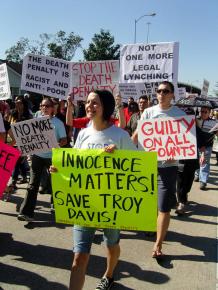Window into a cruel system
has led the struggle to win justice for her brother, Georgia death row prisoner Troy Davis.
In the last two years, Troy has faced three execution dates, each of which was called off with hours to go. So far, the courts have refused to even listen to convincing evidence that he is innocent of the crime wrong convicted of and sent to death row for--the murder of an off-duty Savannah, Ga., police officer.
In February, Martina traveled to San Francisco to speak at a meeting organized by International Longshore and Warehouse Union (ILWU) Local 10 to protest racism and police brutality. Among the other cases featured at the meeting was Oscar Grant, the Oakland resident who was killed on a rapid transit station platform in the early morning hours of New Year's Day.
Martina wrote this article about her trip to the Bay Area.
AS I sit today, reflecting on a recent trip to the Bay Area in California, I am filled with so many thoughts, so many emotions and so many more questions.
I received an invitation from the ILWU Local 10 Labor Union in San Francisco to speak about the case of Troy Anthony Davis on Georgia's death row. I was excited and puzzled by the invitation.
Excited that so many people from across the country are devastated, that in the largest, supposedly most civilized country in the world, innocence does not hold the same importance as retribution, punishment and finality in the U.S. court systems.
Puzzled that I received a call from one of the largest most progressive labor unions in the nation; maybe because I live in a city where the labor unions are the most segregated and apathetic group of people in regards to community issues and justice, unless it affects one of their family members. I personally wish I could package up some of the activism and advocacy in the various communities and college campuses I have visited, and import those ideals of humanity in Georgia.

In the dozens of interviews, talking about my brother Troy Davis and the courts' unwillingness to be fair when a man's life is at stake, I am able to take the audience to a place that seems like the regression of civil and human rights. I see their puzzled faces, trying to comprehend the knowledge that "it is not unconstitutional to execute the innocent if the state feels they received a fair trial." Their next question: "What can we do?"
In town hall meetings, sitting next to the friends and family of Oscar Grant describe their ordeals, I feel the turmoil and uproar that so many are experiencing after his murder, then I feel the outrage of emotion as yet another case of injustice unfolds. I can see the face of Oscar Grant, not because I know him, but because I know this story. It is becoming common in communities of color.
In a nation that elected its first African American president on a platform of change, you would think we are a more tolerant nation, more understanding since we are so culturally diverse. Yet I live in a community where children can't wear a Barack Obama T-shirt to school, because it is considered offensive and inciteful to some.
Most disturbing to me was the experience that family members have when visiting San Quentin Prison. I was approved to visit with a death row prisoner and his family, and the visit was cancelled due to the rain, when water flooded the prison, yet some inmates had visits and others did not. I was simply told to make another appointment for next week, like I lived across the Bay; I live in Georgia.
Some death row inmates have contact visits, some do not, and some families visit in cages, some behind glass on a telephone, but no family I talked to at the prison was treated with respect. In fact, after the brief encounter I had with two guards at visitation, I felt as if I had done something wrong--like they wanted to punish me because I cared about a death row inmate.
There is no one to complain to, they refuse to allow you to speak to a supervisor, and you call for hours before getting anyone on the phone. In fact, the guard I was talking to never looked me in my face, and when he said no visitation, without explanation, he signaled for the next person in line as if I had vanished from his presence.
We all know there are a lot of guilty people in jail, and most of them do their time and expect a second chance--and yes, there are those for whom second chances will never be a possibility.
The stories of the adjustment center and prisoners in the hole, not receiving any outside contact, mail, phone or visitation, and the torment they endure--as if it is not enough that they are imprisoned as punishment, but some feel they must be punished more in prison. I thought to myself, "There is no humanity here, President Obama. Yes, we are a country that tortures, and we are good at it."
This is why I say that for me, this is not just about Troy Anthony Davis, innocent on Georgia's death row. Troy's case for me is a window looking into a systemic problem that must be addressed.


